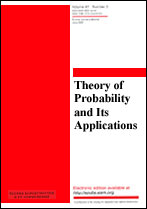|
|
Teoriya Veroyatnostei i ee Primeneniya, 1974, Volume 19, Issue 3, Pages 457–471
(Mi tvp2920)
|
|
|
 |
This article is cited in 17 scientific papers (total in 17 papers)
Extension of measures and stochastic equations
M. P. Ershov
V. A. Steklov Mathematical Institute, USSR Academy of Sciences
Abstract:
E. Szpilrajn-Marczewski [2] constucted a measure on a sub-$\sigma$-algebra of the Borel $\sigma$-algebra in a complete separable metric space which could not be extended to the Borel $\sigma$-algebra. That measure was not separable. In connection with this example, E. Szpilrajn-Marczewski [3] posed the following problem: whether any separable measure on the $\sigma$-algebra generated by a family of Borel sets in a complete separable metric sprace can be extended to the whole Borel $\sigma$-algebra.
In the paper, this problem is answered, in general, negatively. However, it is proved that an extension does exist under the condition that the $\sigma$-algebra the original measure is defined on is countably generated.
The problem of extending a measure is shown to be equivalent to that of solving a stochastic equation: given a measurable mapping $F$ of a measurable space ($X$, $\mathscr X$) into a measure space ($Y$, $\mathscr Y$, $\nu$), a measure $\mu$ on ($X$, $\mathscr X$) is called a solution of the stochastic equation
$$
F\circ\mu=\nu
$$
if, for any $B\in\mathscr Y$ $\mu(F^{-1}\circ B)=\nu B$.
For sufficiently “respectable” spaces ($X$, $\mathscr X$) and ($Y$, $\mathscr Y$), the condition
$$
(F^{-1}\circ B)\ne\varnothing\quad\forall B\in\mathscr Y\colon\nu(B)>0
$$
is proved to be sufficient (and obviously necessary) for the equation $F\circ\mu=\nu$ to have at least one solution.
The problem of uniqueness of a solution of the equation $F\circ\mu=\nu $, respectively, of an extension of a given measure is also investigated.
Received: 03.09.1973
Citation:
M. P. Ershov, “Extension of measures and stochastic equations”, Teor. Veroyatnost. i Primenen., 19:3 (1974), 457–471; Theory Probab. Appl., 19:3 (1975), 431–444
Linking options:
https://www.mathnet.ru/eng/tvp2920 https://www.mathnet.ru/eng/tvp/v19/i3/p457
|


| Statistics & downloads: |
| Abstract page: | 304 | | Full-text PDF : | 141 |
|




 Contact us:
Contact us: Terms of Use
Terms of Use
 Registration to the website
Registration to the website Logotypes
Logotypes







 Citation in format
Citation in format 
